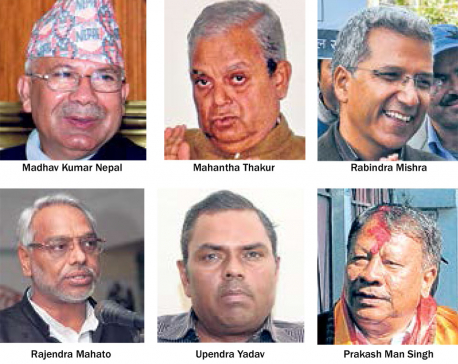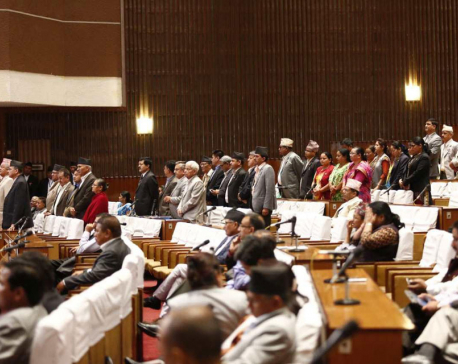
OR
Polls open in landmark referendum on Macedonia's name
Published On: September 30, 2018 12:30 PM NPT By: Associated Press
SKOPJE, Sept 30: Macedonians were deciding Sunday on their country's future, voting in a referendum on whether to accept a landmark deal ending a decades-old dispute with neighboring Greece by changing their country's name to North Macedonia, paving the way to NATO membership.
The June deal would end a dispute dating from the early 1990s when Macedonia declared independence from Yugoslavia. Greece argued use of the term implied territorial ambitions on its own province of the same name, and blocked the country's efforts to join NATO.
But the agreement has faced vocal opposition from much of the public on both sides of the border. Opponents in Macedonia, including the country's president, Gjorge Ivanov, have called for a boycott of Sunday's referendum. Ivanov has called the deal "poisonous" and a "flagrant violation of sovereignty."
Voters heading to polling stations were confronted with the question: "Are you in favor of membership in NATO and European Union by accepting the deal between (the) Republic of Macedonia and Republic of Greece?"
The referendum was called as a consultative, non-binding move even though the vote was not required as part of the deal. The distinction means the government could take the outcome as a fair reflection of public opinion and act accordingly, regardless of how many Macedonians participate in the referendum. Under the country's constitution, a binding referendum would need a minimum turnout of 50 percent to be considered valid.
The campaign in the run-up to the vote has been relatively muted. With opponents urging people not to vote, the vast majority of posters have favored the government-led "Yes" campaign.
If the "Yes" vote wins, Macedonia will have to amend parts of its constitution to ensure it doesn't contain anything that could be considered irredentist against Greece. Only after those changes are approved by parliament does the deal face ratification in Greece.
The referendum has stirred strong interest in the West, with a veritable parade of foreign government officials, including Germany Chancellor Angela Merkel and US Defense Secretary Jim Mattis, heading to the Macedonian capital Skopje in recent weeks to urge its people to vote "Yes." There has been growing concern over the reach of Russia, which is not keen on NATO expanding its members in a part of Europe that was once within its sphere of influence. During his visit, Mattis said there was "no doubt" Moscow funded groups inside Macedonia to campaign against the name change.
Supporters of the deal, led by Prime Minister Zoran Zaev, have focused on the campaign as being the lynchpin of the country's future prosperity, the key to its ability to join NATO and, eventually, the European Union. It would be a major step for a country that less than two decades ago almost descended into civil war, when parts of its ethnic Albania minority took up arms against the government, seeking greater rights.
Even if Macedonians vote in favor of the deal on Sunday, the agreement still faces several hurdles before it can be fully ratified.
The constitutional amendments that are required need a two-thirds majority of parliament's 120 members to go through. So far Zaev has pledges of support from 73 — seven short of the required number.
Once that hurdle is overcome, Greece must then ratify the deal. But Greek Prime Minister Alexis Tsipras faces problems of his own. His governing coalition partner, right-wing Independent Greeks head Panos Kammenos, has vowed to vote against the deal in parliament, leaving Tsipras reliant on opposition parties and independent lawmakers to push the deal through.
You May Like This

Some leaders to miss vote, others to be unable to vote for themselves
KATHMANDU, Dec 7: Some senior political leaders will be unable to vote for their own candidacies in Thursday’s first elections under... Read More...

Even if election is deferred in Province-2 the rest of the country will vote on May 14 (with video)
There are only 45 days for the much-awaited May 14 local level election. But doubts remain about whether the Election Commission will... Read More...

UML may face no-trust vote
KATHMANDU, July 13: Ruling CPN-UML has indicated it will face no-confidence motion if registered in parliament and not quit the... Read More...





Just In
- 286 new industries registered in Nepal in first nine months of current FY, attracting Rs 165 billion investment
- UML's National Convention Representatives Council meeting today
- Gandaki Province CM assigns ministerial portfolios to Hari Bahadur Chuman and Deepak Manange
- 352 climbers obtain permits to ascend Mount Everest this season
- 16 candidates shortlisted for CEO position at Nepal Tourism Board
- WB to take financial management lead for proposed Upper Arun Project
- Power supply to be affected in parts of Kathmandu Valley today as NEA expedites repair works
- Godepani welcomes over 31,000 foreign tourists in a year






_20220508065243.jpg)







Leave A Comment